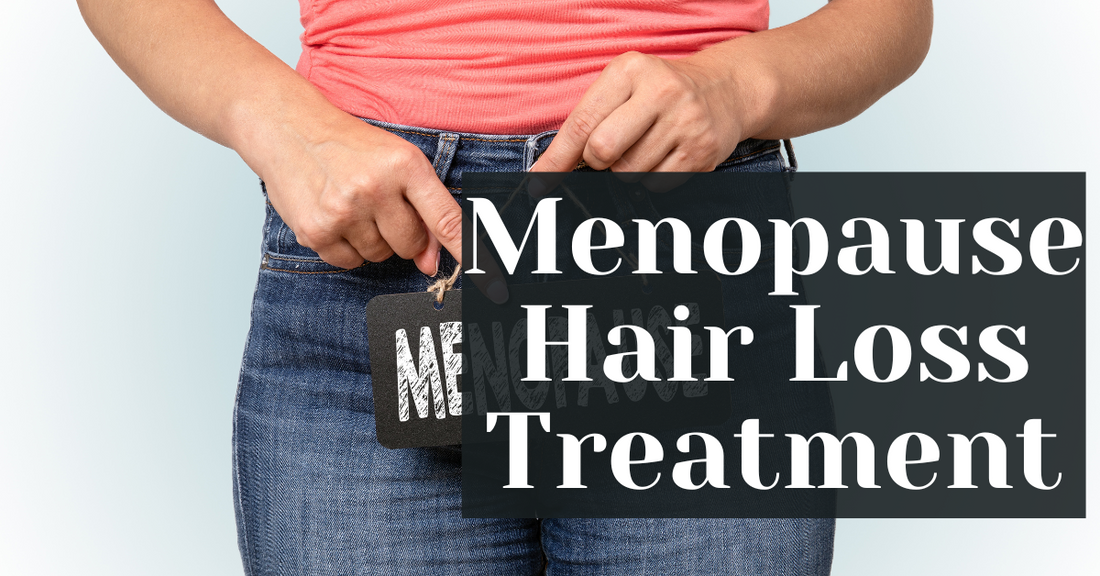
Menopause Hair Loss Treatment
Menopause marks a significant transition in a woman's life, characterized by the cessation of menstrual periods and marked by various physical symptoms, one of the most distressing being hair loss. As estrogen and progesterone levels drop, many women notice their hair thinning, which can be a significant blow to their self-esteem.
However, it's not all doom and gloom postmenopausal women. This blog post aims to explore the multifaceted approach to treating hair loss associated with menopause, offering hope and solutions to those affected further hair loss.
Menopausal hair loss, or female pattern hair loss, occurs primarily due to hormonal changes but is often exacerbated by other factors such as stress, nutritional deficiencies, and other health conditions. Recognizing the causes and symptoms of hair growth early on can pave the way for effective treatments and lifestyle adjustments that can mitigate this condition.
By understanding the underlying mechanisms and exploring both medical and natural treatments, this article will guide you through managing hair loss during this challenging time.
Understanding Hair Loss During Menopause
What Causes Female Pattern Hair Loss in Menopause?
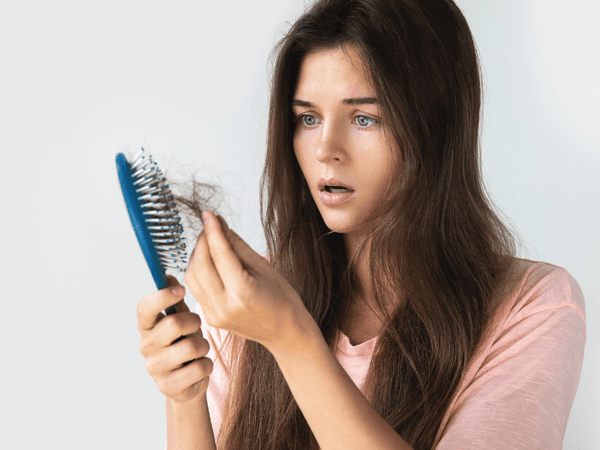
Menopausal hair loss primarily stems from hormonal changes. The decline in estrogen and progesterone levels that accompanies menopause doesn't just affect reproductive health but also impacts hair growth cycles.
Estrogen is known to promote hair growth, prolong the hair follicles shrink the anagen phase (growth phase) of the hair cycle. When estrogen levels drop, hair grows more slowly and becomes thinner. Additionally, the body's relative increase in androgens (male hormones that women also have) can cause hair follicles to shrink, reducing the hair shaft volume.
Other menopause-related factors exacerbating hair loss include:
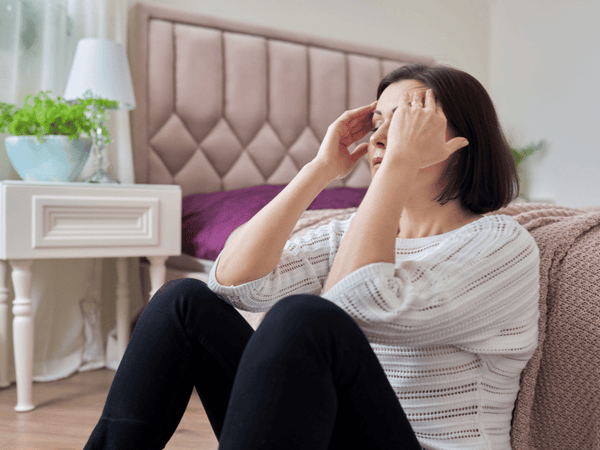
-
Stress: Emotional stress during menopause can lead to telogen effluvium, a condition where more hairs enter the resting phase, leading to noticeable shedding.
-
Nutrition: Decreased hormone production may affect the body's absorption and processing of nutrients critical for hair health, such as iron, zinc, and certain vitamins.
-
Overall health changes: Thyroid disorders, which are more common in post-menopausal women, can also contribute to hair thinning.
How Common is Hair Loss Among Menopausal Women?
Hair loss during menopause is quite common, affecting approximately 40% of women by age 50. It often begins with a widening of the part or a thinning at the crown, which gradually progresses.
Personal stories or testimonials:
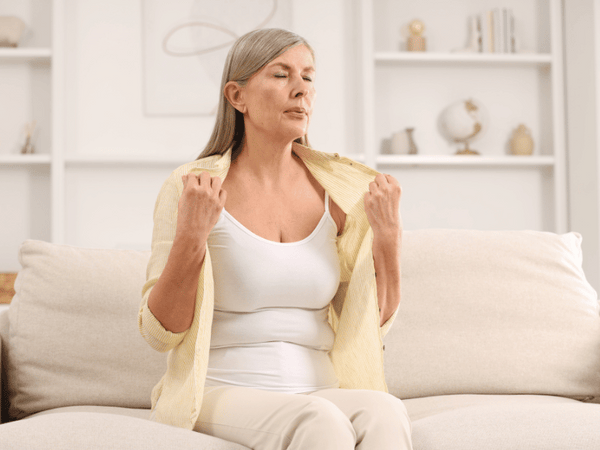
"I started noticing my hair thinning at the temples just as I entered menopause. It was quite a shock because I always had very thick, vibrant hair. Learning about the hormonal imbalances helped me address my hair loss more effectively." – Janet, 52
Diagnosing Menopausal Hair Loss
Signs and Symptoms of Menopausal Hair Loss
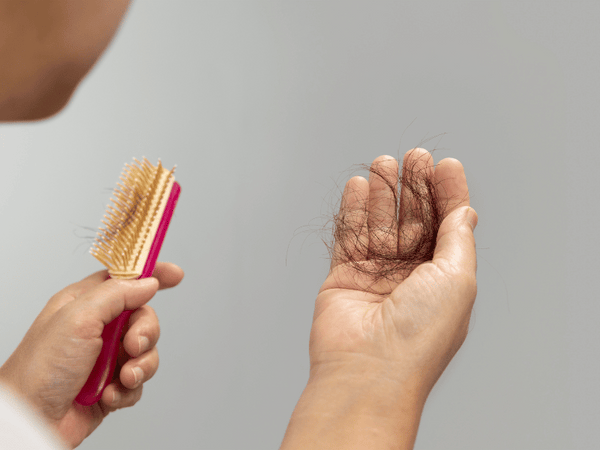
Menopausal hair loss typically manifests as a general thinning of the hair, particularly at the crown and hairline, rather than bald patches. Common signs include:
-
Increased shedding: Noticing more hair than usual on your pillow, shower drain, or hairbrush.
-
Visible scalp: Thinning that makes the scalp more visible than before.
-
Slow hair growth: Hair seems to grow slower and appears thinner and less vibrant.
It's important to differentiate menopausal hair loss from other types of hair loss like alopecia areata, which can cause patchy hair loss, or hair thinning due to nutritional deficiencies and stress. Observing the pattern and nature of the hair loss can provide clues to its cause.
When to See a Doctor
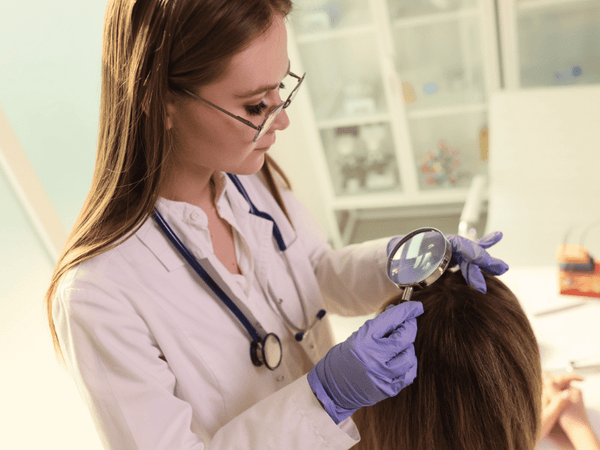
While some hair thinning with age is normal, it’s advisable to consult a healthcare provider when:
-
The hair loss is sudden or patchy.
-
You notice other symptoms, such as changes in your menstrual cycle, severe skin or nail problems, or overall health declines, which could indicate other underlying health issues.
-
You're concerned about the extent of your hair loss.
During a medical consultation, expect discussions and possibly tests regarding:
-
Hormonal levels: Checking levels of estrogen, testosterone, and thyroid hormones.
-
Nutritional status: Blood tests to detect deficiencies in vitamins and minerals important for hair health.
-
Scalp examination: To rule out other conditions like dermatitis or psoriasis.
Visiting a healthcare professional can not only provide peace of mind but also tailor a treatment strategy that addresses both the symptoms and the root causes of hair loss during menopause.
Treatment Options to Stimulate Hair Growth During Menopause
Medical Treatments
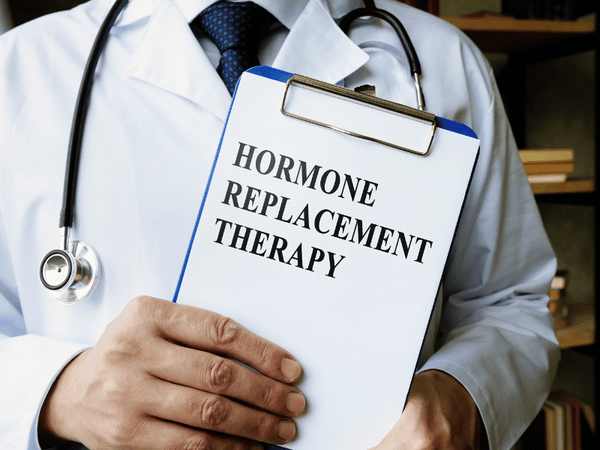
When addressing menopausal hair loss, there are several medical treatments that may be effective:
-
Topical Treatments:
-
Minoxidil (Rogaine): This over-the-counter topical treatment is FDA-approved for female pattern hair loss. It works by extending the growth phase of hair follicles and increasing blood flow to the scalp, which enhances follicle size and hair diameter. Typically applied once or twice daily, it can take several months to see results.
-
Prescription Medications:
-
Hormone Replacement Therapy (HRT): Although not primarily used for hair loss, HRT can help in cases where severe hormonal imbalances are contributing to thinning hair. It replaces hormones that are at lower levels as you approach menopause.
-
Anti-androgens: Medications like spironolactone can reduce the action of androgens (male hormones) that increase in relative levels during menopause and contribute to hair loss.
Hair transplants, including techniques like follicular unit hair transplant-ation and hair grafting, are becoming increasingly popular among women experiencing menopausal hair loss. These procedures involve transplanting hair from denser areas of the scalp to thinning areas, considering factors such as candidacy, cost, time-intensiveness, success rates, and potential side effects.
Additionally, platelet-rich plasma (PRP) therapy is an emerging treatment where a patient's blood is drawn, the plasma separated, and then injected into the scalp. This semi-experimental treatment, often used in conjunction with several other treatments and hair loss interventions, has shown promise in treating hair loss in menopausal women, despite its high cost and the need for multiple sessions to gauge effectiveness.
Natural and Home Remedies

Many women prefer to start with natural remedies to treat hair loss and manage their hair loss:
Vitamins and Supplements:
-
Vitamin D: A deficiency in Vitamin D is linked to hair loss; supplementing it can help support hair regeneration.
-
Biotin: Part of the vitamin B family, Biotin is known for strengthening hair and nails.
-
Omega-3 Fatty Acids: Found in fish oil and flaxseed oil, omega-3s can boost hair health and overall scalp hydration.
Maintaining the right pH balance is crucial for hair cuticle cells to prevent them from lifting and causing hair to appear dull and feel rough. The acidity helps hair cuticle cells lie tightly against each other, protecting the whole hair shaft to maintain hair's ph, integrity and shine.
Herbal Remedies:
-
Saw Palmetto: Often used to treat enlarged prostate symptoms in men, it may also help reduce hair loss in women by blocking 5-alpha-reductase, an enzyme involved in converting testosterone to DHT, a molecule linked to hair loss.
Lifestyle Changes and Home Care
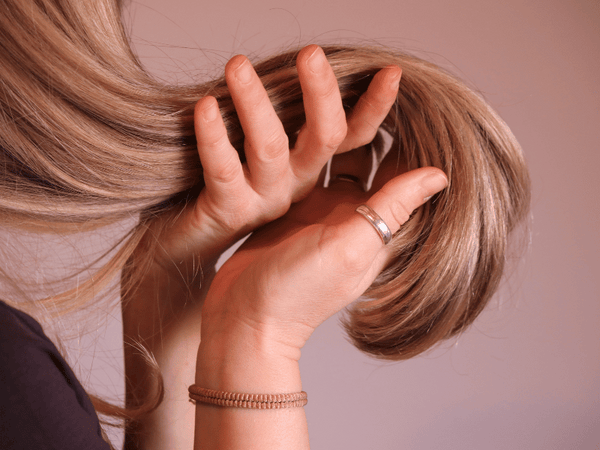
Lifestyle adjustments can also play a critical role in managing hair loss:
-
Dietary Adjustments: Incorporating a diet rich in proteins, iron, zinc, and vitamins can aid hair growth. Foods like spinach, salmon, and nuts are beneficial.
-
Stress Management: Techniques such as yoga, meditation, and regular exercise can reduce stress and its impact on the body, including hair health.
-
Hair Care Practices: Avoid harsh treatments such as hot tools, harsh dyes, and hairstyles that pull on the hair (like tight ponytails or braids) that can exacerbate hair loss.
Preventive Measures to Avoid Hair Loss During Menopause
Implementing preventive measures can significantly help in minimizing hair loss during menopause. Here are key strategies that can support hair health and reduce the risk of excessive hair shedding too:
Nutritional Tips to Strengthen Hair
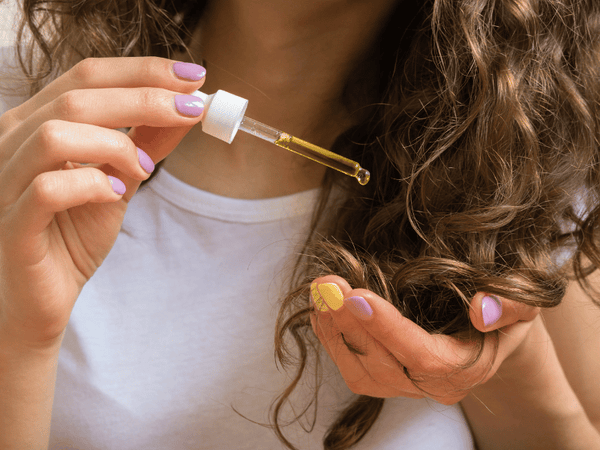
A nutrient-rich diet plays a critical role in maintaining healthy hair growth. Including the following nutrients in your diet can provide the necessary support for your hair during menopause:
-
Protein: Hair is primarily made of protein, so adequate protein intake is essential. Include lean meats, fish, beans, and legumes in your diet.
-
Iron: Iron deficiency can lead to hair loss. Good sources of iron include leafy green vegetables, fortified cereals, and red meat.
-
Vitamin C: It helps with the absorption of iron and is an antioxidant that supports hair follicles. Include fruits like oranges, strawberries, and bell peppers.
-
Omega-3 Fatty acids: help lubricate the scalp and support hair growth. Sources include fish like salmon and mackerel, flaxseeds, and walnuts.
Hair Care Techniques
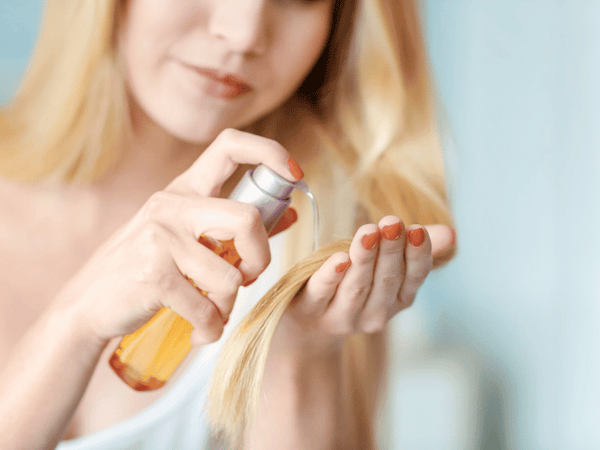
Proper hair care can also prevent damage and loss fine hair too:
-
Gentle Hair Handling: Avoid tight hairstyles that pull on the hair. Use a wide-tooth comb for detangling to minimize breakage.
-
Avoid High Heat: Limit the use of hair dryers, curling irons, and straighteners, which can weaken hair.
-
Choose Suitable Hair Products: Opt for mild shampoos and conditioners designed for thinning hair. Avoid products with harsh chemicals that can strip natural oils from the scalp.
Environmental and Lifestyle Factors
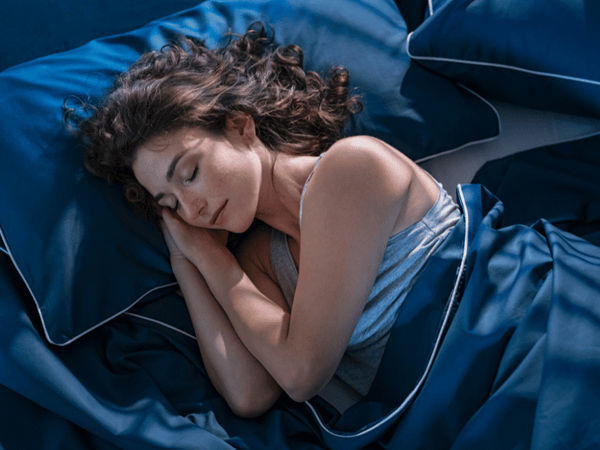
-
Stress Management: Chronic stress can exacerbate hair loss. Engage in stress-reducing activities like yoga, meditation, or regular exercise.
-
Sleep: Quality sleep is vital for overall health and can also affect hair health. Aim for 7-9 hours per night.
-
Scalp Care: Frequent scalp massages can improve blood flow to the area, which encourages the growth of new hair. Use essential oils like lavender or peppermint oil mixed with a carrier oil to enhance the benefits.
These preventative steps can help mitigate hair loss during menopause and improve overall hair health. By adjusting your diet, hair care routine, and managing environmental factors, you can significantly influence the health of your hair.
Innovations and Research in Treating Menopausal Hair Loss
The field of hair loss treatment, particularly for menopausal women, is continuously evolving, with new research and innovative technologies emerging regularly. Here's a look at the latest advancements and future trends in treating menopausal hair loss:
Latest Research on Menopausal Hair Loss
Recent studies have focused on understanding the specific mechanisms behind hair loss in menopausal women and how treatments can be targeted more effectively:
-
Hormonal Impact Studies: Research continues to explore how fluctuations in hormone levels directly affect the hair growth cycle. Studies are looking at ways to counteract these effects with topical applications that can mimic estrogen's beneficial effects on the scalp.
-
Genetic Research: Scientists are investigating the genetic basis of hair loss during menopause, which could lead to more personalized treatment options in the future.
Future Trends in Treatment Options
Innovation in treatment methods is promising, with several new approaches being tested:
1. Stem Cell Therapy:
-
Researchers are experimenting with stem cell therapies to rejuvenate hair follicles that have shrunk during menopause. Early trials show potential in reactivating dormant hair follicles, thus promoting new hair growth.
2. Laser Therapy:
-
Low-level laser therapy (LLLT) is gaining traction as a non-invasive option to stimulate hair growth. It uses specific wavelengths of light to encourage cellular activity in the hair follicles.
3. Natural and Alternative Remedies:
-
The use of natural ingredients and traditional medicines is being scientifically tested more rigorously. Ingredients like ginseng, which has been shown to promote hair growth in preliminary studies, are being explored for their efficacy and safety.
4. Topical Growth Factors:
-
New topical treatments that apply growth factors directly to the scalp are in development. These growth factors are proteins that can stimulate hair follicle growth and are seen as a promising area of treatment without the side effects associated with systemic medications.
As research progresses, the hope is that more effective and tailored treatments will become available, making hair loss during menopause a more manageable condition. The advancements not only promise improved hair growth but also offer insights into the biological processes of aging and hair follicle health.
How Koze Health Red Light Devices Can Help Address Menopausal Hair Loss
Red light therapy, offered by devices such as those from Koze Health, is emerging as a promising non-invasive treatment option for various women's health issues, including hair loss associated with menopause. Here's how these devices can play a pivotal role in managing and potentially reversing hair thinning during this transitional phase in a woman's life:
Understanding Red Light Therapy
Red light therapy involves exposing the scalp to red or near-infrared light. The wavelengths used in this type of therapy typically range from 630 to 670 nanometers, which are believed to penetrate the skin and stimulate cellular activity. The theory is that this light energy can encourage hair follicles to remain in the growth phase (anagen) for longer periods, promoting healthier hair growth and increasing hair density.
Mechanism of Action
The effectiveness of red light therapy in treating hair loss hinges on its ability to:
-
Stimulate Energy Production: Red light is absorbed by mitochondria in the hair follicle cells, enhancing their energy production (ATP). This increased energy may support and extend the anagen phase of hair growth.
-
Increased Blood Circulation: Improved blood flow to the scalp can result in an increased supply of nutrients and oxygen to hair follicles, essential for healthy hair growth.
-
Reduce Inflammation: Chronic scalp inflammation can hinder hair growth by damaging hair follicles. Red light therapy has anti-inflammatory properties that help reduce such inflammation, creating a healthier environment for hair growth.
Benefits of Koze Health Red Light Devices
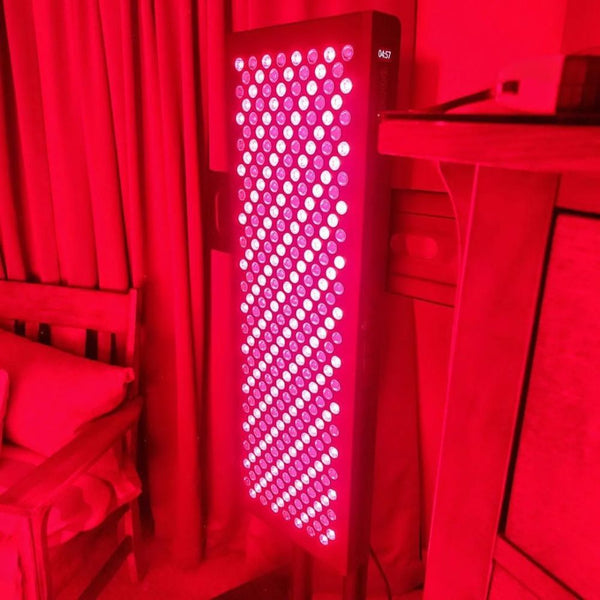
Koze Health's red light devices are designed to offer:
-
Ease of Use: These devices are user-friendly, designed for home use, and can be easily incorporated into daily routines.
-
Safety: Red light therapy is considered safe, with minimal side effects, making it an appealing option for those hesitant about pharmaceutical treatments.
-
Effectiveness: While individual results can vary, many users report noticeable improvements in hair thickness and overall scalp health after regular use.
How to Use Koze Health Devices
To achieve the best results from a Koze Health red light device for hair loss, follow these tips:
1. Consistency is Key: Regular use, as recommended—typically several times per week—is crucial for seeing results.
2. Direct Application: Position the device close to the scalp to ensure maximum light penetration.
3. Duration of Treatment: Each session should last about 10–15 minutes, depending on the specific device and user comfort.
Koze Health's red light devices offer a viable solution for women experiencing significant hair loss, during menopause. By providing a safe, effective, and non-invasive treatment option, these devices help combat the often distressing symptom of hair thinning, restoring not only hair but also a sense of well-being and self-esteem.
Coping with the Emotional Impact of Hair Loss During Menopause
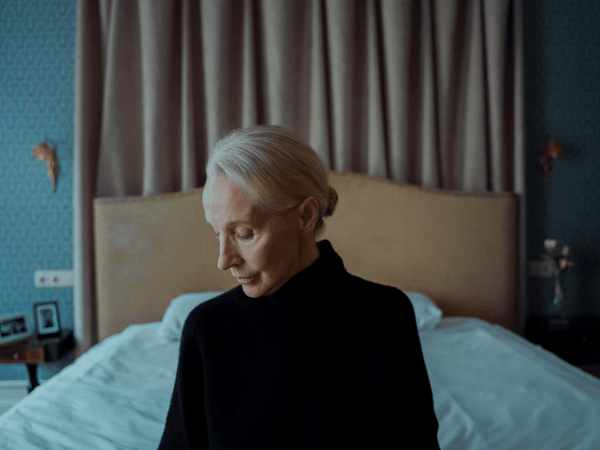
Menopausal hair loss is not just a physical issue; it often carries significant emotional and psychological burdens. Understanding how to manage these aspects is crucial for overall well-being. Here’s how to navigate the emotional landscape of hormonal hair loss and during menopause:
Emotional and Psychological Considerations
Hair is often seen as a symbol of youth and vitality, and losing it can lead to feelings of diminished self-esteem and identity. Women may experience:
-
Stress and Anxiety: Concerns about appearance and the progression of hair loss can cause significant stress and anxiety.
-
Depression: Persistent sadness or loss of interest in activities once enjoyed can be symptoms of depression, which may be exacerbated by changes in appearance.
Strategies for Coping
Managing the emotional impact involves several strategies that focus on mental health and community support:
-
Seek Professional Help: Talking to a therapist can provide strategies to cope with the changes and challenges menopause brings, including hair loss.
-
Connect with Others: Support groups, either in person or online, can connect you with people facing similar issues. Sharing experiences and tips can be incredibly reassuring.
-
Focus on Overall Wellness: Engaging in activities that promote physical health, such as exercise, can also enhance your mental health and help manage stress.
Building a Positive Self-Image
-
Experiment with New Styles: Wigs, scarves, and new hairstyles can offer a fresh look and help boost confidence.
-
Embrace Self-Care: Treat yourself to spa days or other pampering activities that make you feel good about yourself.
-
Educate Yourself and Others: Understanding that hair loss is a common menopausal symptom can normalize the experience and reduce stigma.
Frequently Asked Questions
Here are answers to some common questions about menopausal hair loss treatment:
How long does it take to see results from hair loss treatments?
Results can vary based on the treatment type, but typically it takes several months of consistent treatment to see noticeable improvements.
Are there any side effects to the treatments mentioned?
Most treatments have potential side effects. For instance, Minoxidil may cause scalp irritation, and in the case of using a stronger 5% solution, there's a risk of excessive hair growth, specifically hypertrichosis, which is the growth of hair in unwanted areas.
Similarly, oral medications like finasteride and spironolactone, prescribed to treat hirsutism and androgen-related unwanted hair growth in females, can also lead to unwanted hair growth as a side effect. Hormone replacement therapy has broader systemic effects. Always consult a healthcare professional before starting any new treatment.
Can lifestyle changes alone stop hair loss during menopause?
While lifestyle changes alone might not stop hair loss completely, they can significantly reduce its extent and impact. A healthy diet, reducing stress, and proper hair care are crucial.
Is hair loss during menopause reversible?
In many cases, hair loss during menopause can be managed and significantly improved, but reversing it depends on several factors, including the treatment method and individual health conditions.
Conclusion
Navigating the challenges of menopausal hair loss involves a comprehensive approach that includes understanding the underlying causes, improving hair growth, exploring effective treatments, and managing the emotional impacts. As we've discussed throughout this article, there are several strategies to address each aspect of this common condition:
1. Understanding the Causes: Recognizing that hormonal changes during menopause play a significant role in hair loss sets the foundation for targeted treatments and interventions.
2. Exploring Treatments: From medical options like Minoxidil and hormone replacement therapy to natural remedies and lifestyle changes, there are diverse approaches to managing hair loss. Innovations such as red light therapy devices from Koze Health also offer promising non-invasive alternatives.
3. Emotional Support: Addressing the psychological impact is crucial. Seeking support through therapy, connecting with others experiencing similar issues, and engaging in self-care are vital steps in maintaining mental health and well-being.
4. Preventive Measures: Adopting a healthy lifestyle, including proper nutrition and hair care practices, can help mitigate the cause of hair loss and promote overall health.
By incorporating these strategies, women can better manage their menopausal symptoms, and improve their quality of life during menopause. Remember, while menopausal hair loss can be distressing, it is a treatable and manageable condition. Consulting with healthcare providers to tailor a personal care plan is recommended to effectively address both the physical and emotional aspects of hair loss.


